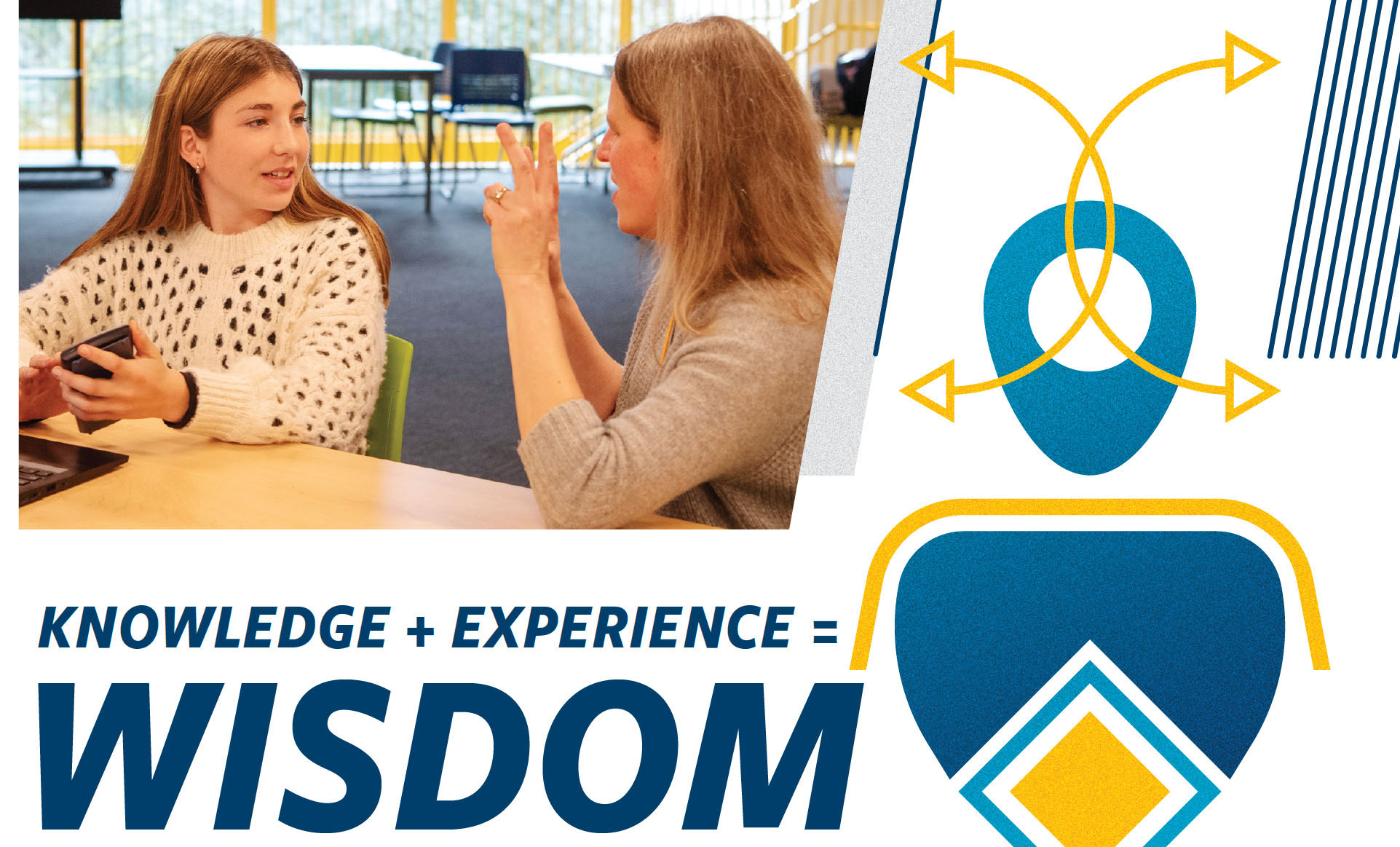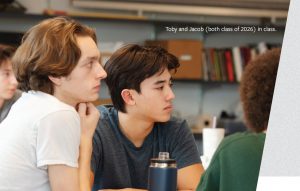
By Sam Uzwack, Head of School
It turns out there’s a lot to say about wise innovation. I learned this as I sat down to write about the topic and set the theme for this issue of Inspire. There was so much to say; in fact, that beginning was a little daunting. So I tackled the subject of innovation by starting at the beginning…twenty-one years ago in Eastside Prep’s history.
Wise Innovation as a Mission Point
The three founders of Eastside Prep (Patricia Friel, Janet Levinger, and Maureen O’Hara), along with founding Head of School Dr. Terry Macaluso, are some of the most visionary people I’ve ever met. They had an idea for a school that didn’t exist. To be able to conjure a school without a model…that’s the definition of innovation.
I believe the founders chose innovation as one of the four Mission points because it was essential to them that EPS has an ethos that not only is this a school to teach kids, this is a school where we can learn about school, a school where we can learn about best practices in education—not based on fads or trends, based on research, based on science, based on best practice. Schools are not necessarily known as great innovators in society. Many components of the educational system we experience today were formed in the late 1800s, so adding innovation to our Mission points helped ensure that a spirit of healthy change was alive every day. And, of course, our Mission points are not complete without the modifiers. With innovation specifically, wisdom becomes important as you’re thinking not only about what you can do but what you should do.
The Pace of Change
When you think about schools and innovation, it’s important to note that schools are a unique and challenging
ALL OF US HAVE HAD SOME POSITIVE AND NEGATIVE EXPOSURE OR INTERACTION WITH EDUCATION AT SOME POINT IN OUR LIVES; THEREFORE, WE ALL HAVE EXPERIENCE WITH IT AND
AN OPINION ON IT
place to innovate in—we are, after all, talking about our kids, their futures, and their well-being. Tinkering can be overwhelming to consider when thinking about our students’ mental, physical, and social health and the systems supporting each of those.
All of us have had some positive and negative exposure or interaction with education at some point in our lives; therefore, we all have experience with it and an opinion on it. Grading is an example—we all understand the meaning of A through F; there’s nothing magical about it; it’s just so baked into our culture and our lexicon. Because it is so familiar to us, anything that doesn’t look like our own experience can seem scary.
And while it may be hard to innovate in the educational space, it’s not impossible. We have to build trust, nurture an ethos of innovation, and show people why the change is actually better. I would put forward independent schools have a responsibility to push toward innovation. We have the resources, the time, and the creativity. And innovation is what draws people to independent schools like Eastside Prep. Professionals who choose to teach here know they can try new things in the classroom and programmatically. I also think that families who choose EPS understand that growth comes through innovation and reasonable risk-taking. There’s a common thread throughout our community—parents/guardians, faculty/staff, and students—of wanting to try new things. And we can take advantage of that thinking because we’re still a young school.

Building Blocks
As you may have guessed from the title of this article, I believe that knowledge and experience help create wisdom. EPS students constantly add knowledge as they learn new skills and subject matter. They’re also gaining experience and, honestly, making mistakes. From those mistakes and experiences, they will learn. And as they learn, experiencing failures and successes, they gain wisdom. And, importantly, wisdom that comes from within. Maybe a good analogy is driving a car. When you first start driving a car, sure, you might know what all the buttons do. You might know how fast the car goes and how everything works. Then you actually get out there on the road, and everything is new; every situation is novel. Because you have the knowledge but not the real-time experience that helps you use the information you have. Experience and judgment have to be developed over time.
Sometimes It Works…
When I arrived at EPS, we had a schedule with all eight periods meeting on three days of the week and only two block period days. We all felt that the schedule didn’t reflect the kind of teaching we wanted to do, which is about depth and complexity. So, we began making changes. First, we moved to a schedule with four block days. We kept one day for an all-class day, partially to preserve things like assembly. But that schedule still wasn’t really working. The TALI building construction (which took away the opportunity for assemblies) was the perfect catalyst for trying something new. So, we went to the entire block schedule with flipping periods that we have today. It took a while, but we focused and gave resources to each change along the way.
And Sometimes It Doesn’t
I’ll provide an example from several years ago. (And I can hear the groans of alums and alumni parents reading this article and remembering this particular moment in EPS history.) One year, we decided to let our Spring Adventures (the precursor to EBC Week) be completely student-driven and planned. It didn’t go as planned, at least partially because we hadn’t prepared the students for the planning that was needed. We owned that mistake. It’s important to know that what we learned from that experience shaped the ideas around the incredibly successful EBC program we enjoy today.
 You probably noted the major difference with the two examples above. With our schedule change, we adjusted incrementally and took time to prepare our community. That’s not as true with our Spring Adventures example. Too often, when we think about change, we think about where we are and where we want to be, and then we want to get there all at once. Incremental steps, understanding why I’m trying something new, and what I can learn from it are essential components to innovation. And sometimes you learn just as much from the efforts that don’t work as from successes. To use a climbing metaphor, you must go one ridge line at a time. You learn as you go from the small triumphs and setbacks.
You probably noted the major difference with the two examples above. With our schedule change, we adjusted incrementally and took time to prepare our community. That’s not as true with our Spring Adventures example. Too often, when we think about change, we think about where we are and where we want to be, and then we want to get there all at once. Incremental steps, understanding why I’m trying something new, and what I can learn from it are essential components to innovation. And sometimes you learn just as much from the efforts that don’t work as from successes. To use a climbing metaphor, you must go one ridge line at a time. You learn as you go from the small triumphs and setbacks.
Gaining Wisdom
Two examples of community members working to gain wisdom come quickly to mind. I learned the other day about an Upper School student who is a strong Ultimate player and has begun coaching some Middle School players. That Upper Schooler has knowledge and experience in that domain, and he’s now imparting that knowledge and wisdom to the Middle Schoolers he’s coaching. And he’s gaining even more wisdom, knowledge, and insight through his coaching.
My second example is pretty exciting to me as an educator. When we set up our Resident Teacher Program, we knew that our Resident Teachers would learn a great deal from their time here. What I’ve heard from each of our veteran faculty who are working with those Resident Teachers is that they are also learning so much about their craft and are able to improve their own teaching and classroom experience. They are unlocking new insights, ideas, and knowledge—what a wonderful added benefit of teaching others how to teach!
What Does the Future of Education Hold
I think it’s borderline impossible to predict what our future holds. AI is going to change everything we know; it already is. AI can do so much work for us, and we need to consider its implications. In the school environment, we have to ask if AI is helping us learn or actually doing the learning. Teachers are already wrestling with this in the classroom. So hang on because it’s going to be fast.
While we may not know precisely what the future holds, we can teach our students to handle ambiguity, understand uncertainty, and be nimble. Part of wisdom is comfort with ambiguity. Maybe a certain element of wise innovation is knowing you will be in a space for a while where you can’t know the answer. And it’s super terrifying, and that’s okay. Critical thinking, acting responsibly, leading compassionately, and innovating wisely are preconditions to handling that uncertainty. We can’t possibly predict what’s going to be out there in the years to come; we need to prepare people to be able to handle whatever happens.
And we need to help our students understand that it’s okay to mess something up authentically. With an ethos of continual improvement and innovation, you can’t move forward unless you’re willing to experience failure from time to time.
If you read my introduction to this issue of Inspire, I ask if wise innovation is a natural result of our first three mission points or if it is something more…“a spirit of wonder, exploration, and responsibility.” I’ll tip my hand a bit. While there’s room for discussion, I don’t actually think it’s just a natural offshoot of the first three points. People come to EPS because learning is wondrous. Students tell us they come here because it’s okay to learn and to care about learning. Teachers and staff come here because they continue to learn and explore, they know they can’t know everything, and they wonder about the future. And we couple all of that with the responsibility to care for one another.
As I reflect on how wise innovation is alive and well at EPS, I appreciate that our community will aim high and see learning and teaching as noble pursuits worthy of our time, energy, tears, and sweat. We’re not afraid to put our heads in the clouds from time to time and say, “Wow, what if….”

